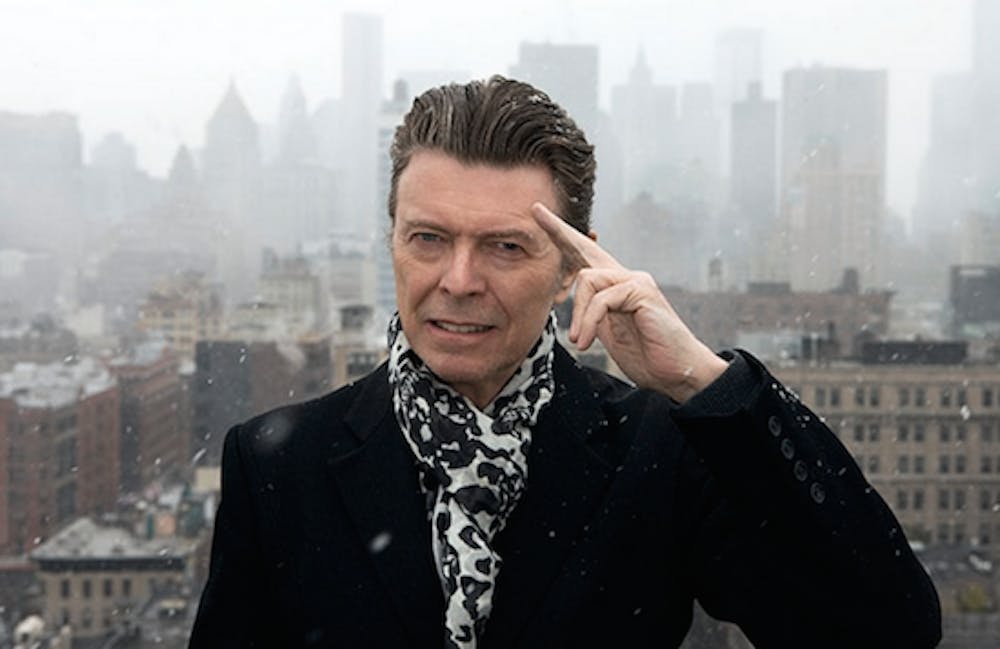[caption id="" align="aligncenter" width="500"] The Man Who Fell to Earth, 1976[/caption]
The Man Who Fell to Earth, 1976[/caption]
The first David Bowie song I fell in love with was "Life on Mars?". I was a morose 14-year-old entering a retrospectively irritating age of nihilism, and morose 24-year-old David reached to me across the years with Hunky Dory. He echoed and held me through friendless lunches and existential confusion. To me, he was everything. A constant outsider, an anomaly, perfectly alien and content to be. An unattainable perfect. I was a gay brown atheist in a Catholic school, but that was fine, because David Bowie wore a dress and one legged jumpsuit and spent 1974-1976 higher than a kite and turned out okay.
But above all, he was untouchable. I grasped at his wide and wild discography, trying to bring it all into my being like manna, precious and impossible. I was starving. The jazzy and artful Black Tie White Noise slipped from me, and his green and soft face on the cover of the self-entitled David Bowie was almost a stranger, like a god had shrank. I wrote tributes to him in clumsy adolescent poetry and evoked him in my thoughts, wondering about his day and wishing him well from the middle of America.
I fell in love with him long after he stopped performing live, long after the release of Reality in 2003. My US release of Station to Station, which came with a two-disc live recording of a 1976 Nassau Coliseum concert, was sweet nectar. I can't begin to compress his gigantic soul into a single favorite album, but I listened to Station to Station the most. I resisted listening to it for the longest time, due to a combination of revulsion and fear. He was the Thin White Duke, a frightening and skeletal non-man I could not reconcile with Ziggy or the David of "Modern Love". On the Nassau tracks, though, he was a corpse revived, breathing color into cold studio recordings, with a lightness to his rich, crooning baritone that I missed wretchedly.
The closest I ever was to him was the Victoria & Albert Museum's touring David Bowie Is exhibition, where I wandered for nearly four hours at the Museum of Contemporary Art in Chicago. This was a little over a year ago, and I morbidly wonder, why then? If an 18-month cancer battle brought him down, when did he start to give us more of himself, after a 10-year hiatus? The Next Day was a comforting art rock blanket, from its rehashed "Heroes" cover to its lead single, Berlin love letter "Where Are We Now?". It was followed by the exhibit, which was followed by the compilation album Nothing has changed, which was followed by the box set Five Years. He finally mounted a stage musical, Lazarus, as he had dreamed since he was a schoolboy in London. On his 69th birthday this past Friday, he released his twenty-fifth and last album, Blackstar -- in the words of Tony Visconti, "his parting gift". And now he's gone, after a glorious three years no one called anything but a comeback.
Did he map out a journey? A timeline in which to offer the last of himself to the the world, the unholy public that ripped Ziggy to pieces? In Chicago, I breathed the air around Kansai Yamamoto's Ziggy tour costumes, saw his and Iggy Pop's Berlin apartment key through a glass. His first instruments, a saxophone, a guitar. I laughed and smiled over two Diamond Dogs artifacts: "Tissue blotted with Bowie's lipstick, 1974" and "Cocaine spoon, 1974", and never once did I think of their meaning: a tour of a living legend's most personal effects that bore more than passing resemblance to Vatican treasures, aged and valued and taken after the deaths of saints. I can't stop thinking of it as a farewell tour, in absentia.
I stood in the exhibit's final gallery for an hour: three walls projecting three live performances amid David's Alexander McQueen-designed frock coats. Visitors were given sensitive Sennheiser headsets that corresponded to their location. You could walk the length of the room and see and hear "Bang Bang", "Five Years", and Jacques Brel's "My Death" in one go. But for one moment while I was there, those headsets went silent. The speakers in the room took over, and "'Heroes'" played, a triumphant and desperate swan song filtered through three performances. In this exhibition where patrons milled about and veered clear of one another, each immersed in their own orbit, we took off our headsets and really looked at each other for the first time. For the length of this one perennially popular song, we forgot ourselves and our little lives. Some of us cried. I certainly did. I imagine that's what it would've been like to be near David.





